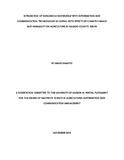| dc.description.abstract | Climate change threatens production’s stability and productivity. In many areas of the world where agricultural productivity is already low and the means of coping with adverse events are limited, climate change is expected to reduce productivity to even lower levels and make production more erratic. To help cope with the negative impacts of anthropogenic climate change, local people employ traditional Indigenous-Knowledge based practices. This local based knowledge, which has evolved over several hundreds of thousands of years in tandem with the domestication of plants and animals, is critical for responding to climate change’s related risks at the local level. ICTs have the potential improve access to this knowledge among other relevant information and social networking opportunities. The study was carried out in Kajiado County at Kumpa, Oloosuyian and Rombo locations. Data were collected through formal interviews using structured questionnaires, FGDs and Key informant interviews. A total of 200 questionnaires were administered, 100 practicing agro pastoralism and 100 pastoralists. The specific objectives of the research was to assess relevant Indigenous knowledge used by Indigenous people to cope and adapt to climate change and variability effects on agriculture as well as evaluate opportunities for utilizing ICTs to communicate and disseminate agricultural production related indigenous knowledge in Kajiado County of Kenya. Results indicated that farmers’ are aware of the changing aspects of climate and their impacts especially prolonged droughts, leading to high crop failure, loss of animals, increase in pest and diseases and human wildlife conflict. These has led farmers shifting to farming historically known drought tolerant crops( green grams, sorghum, and cowpeas,) rain water harvesting, irrigation, use of organic manure, change in planting time, preservation of pastures, vaccination and migration. Among other things, farmers are also increasingly relying on their own indigenous knowledge in determining weather patterns compared to scientific knowledge. Various communication mechanisms taking advantage of ICTs
xi
such as radios and mobile phones are emerging as viable avenues for acquisition and dissemination of agricultural production related information. They are the most preferred ICTs because they are affordable and use local languages to disseminate information. The study recommends increase in the level of awareness to farmers on the importance of environment conservation, drought tolerant crops, rain water harvesting techniques, preservation of pastures. Furthermore, the study recommends the use of radios to disseminate agricultural related information to farmers as well as documentation and dissemination of indigenous knowledge on climate change adoption strategies countrywide through use of the new ICTs. | en |

